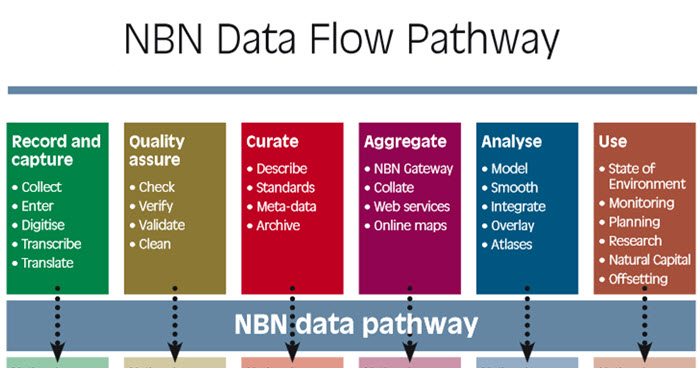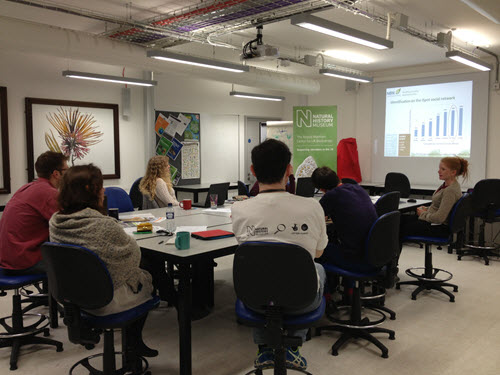Identification Trainers for the Future Update – our trainees have arrived!
Written by Steph West, Project Manager – Identification Trainers for the Future, Angela Marmont Centre for UK Biodiversity, The Natural History Museum
A few months ago you may have seen a post in the NBN eNews introducing our new Identification Trainers for the Future project. This project is supported by the Heritage Lottery Funds Skills for the Future fund and is a partnership project between the Natural History Museum, National Biodiversity Network Trust and Field Studies Council designed to address the increasing UK species identification skills gap in early career ecologists.

At the core of the project are fifteen 12-month long work-based traineeship positions which will be offered over the next 3 years, based at the Museum with support from the NBNT and FSC. We are very pleased to be able to announce that our first cohort of 5 trainees started with us this month. Sally, Katy, Anthony, Chloe & Michael were chosen from a very competitive field of applicants, culminating in a selection day which was held in January. The trainees are currently working their way through a series of introductory workshops which form Phase 1 of their traineeship. From April however they will be working with us in the Angela Marmont Centre for UK Biodiversity in our Information and Advisory Service, on our citizen science projects and helping us to produce field guides and resources, as well as undertaking a series of identification workshops with our expert curators & researchers looking at particular invertebrate and botanical species groups. You might also see them if you come along to one of our events such as Lyme Regis Fossil Festival, Big Nature Day or Science Uncovered. After that they will then be off to various specialist teams around the Museum to focus on their particular UK species group interest area for 3 months before returning to us to start their training in communication skills and teaching delivery so they can learn how to pass their skills on to others.
Over the next few months the trainees are going to be sending in reports to this newsletter to keep you all informed of the work they have been doing, as well as introducing themselves to you. I hope you enjoy following their progress! You can also keep up to date with what they have been up to and find out more about the project via our webpage and our blog which you can find at www.nhm.ac.uk/idtrainers.
Handling and Using Biodiversity Data, 23rd – 24th March 2015
Written by Rachel Stroud
This month, as part of the HLF funded Identification Trainers for the Future Programme, the Secretariat of the NBN ran a two day introductory course to handling and using biodiversity data. At the start of a very busy year this course was designed to give the students a background to the data management and equip them with skills and tools to collect and handle high quality data. Structuring the course around the Data Flow Pathway (see image below), the students learnt the importance of each stage of the pathway in creating robust data flows through which quality data can pass.

The theoretical aspects of the course covered the transition of recording to long term knowledge and wisdom, identifying what is a biological record and the key components it must contain. The students explored where you may be able to find data, and what formats data are held in across the UK. A short history of biological recording, background to the formation of the NBN and the need and benefits of aggregating and sharing data were also discussed. The students learnt some best practice tips for data and document management such as naming conventions, version control and folder hierarchies. The importance of data quality, including validation and verification was a key topic running through both days both in the theoretical and practical aspects.
Alongside the theoretical aspects of data management the course also covered a variety of practical techniques used across the Network to ensure high quality data result from each stage of the pathway. These techniques included tips to validate data in MS Excel using functions such as conditional formatting, filters, Vlookup and IF functions and PivotTables. The students learnt how to use the NBN Record Cleaner rulesets and the UK Species Inventory and learnt a little about rNBN and its application in data analysis. Other key aspects of the course covered thinking about data management at the start of a project. This included designing a recording form and data entry system in parallel to ensure transcription of data is efficient and good quality. Finally the students learnt where to find data in the UK and how to use sites such as the NBN Gateway and GBIF to discover, explore and download data.

At the start of the course the students discussed a time that they had collected and managed data, which was in most instances their undergraduate dissertation. It was great to hear the students talking at the end of the second day about how they would manage the data from their dissertations better if they were able to go back and redo these projects. The Secretariat of the NBN looks forward to hearing how the students progress throughout their year and grow and improve in their data management skills and would also like to give special thanks to Chris Raper, NHM for assisting in delivering this course.
